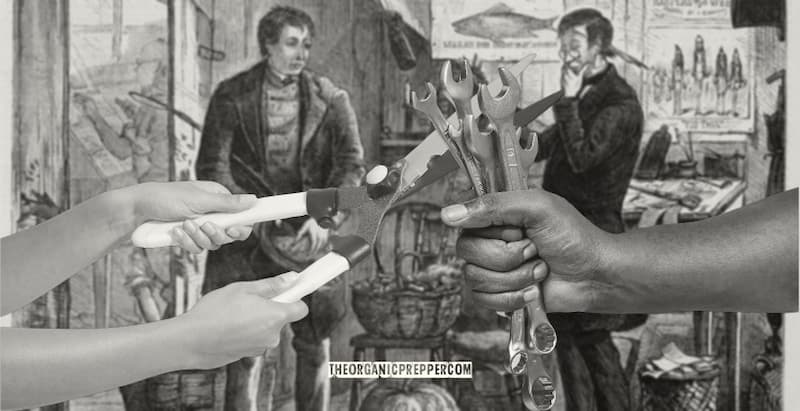() After society crumbles, the ability to use the fiat currency which was in use before vanishes. Likewise, when politicians decide that certain people no longer should be able to purchase food, medicine, or healthcare, the ability to use the fiat currency which was previously stored becomes much more difficult. It’s in times like these that the ability to create a barter network matters.
Related Prepper skills: How to Barter Effectively after SHTF
What does this entail? Are there things I learned about this from living through the collapse of Venezuela? Absolutely, but first, we must understand that this is nothing unique. The creating of barter networks is absolutely nothing new.
Barter has history.
Trade is intrinsically tied to mankind. One doesn’t have to look far in ancient history to find semi-nomadic tribes living by the ocean exchanging seashells, salty fish, or textiles to get what they needed. When society returns to a primitive state, the means of exchange will as well.
In this article, I will limit myself to deal with physical bartering. Selco has covered pretty well the skills bartering topic in this article. Of course his experiences come from much more crude scenarios, if you will. Venezuela post-collapse was bad, but it wasn’t a literal war zone.
Like anything else, bartering has advantages and disadvantages. The main advantage? Not having to use money. This link elaborates on that.
What should you take in account for starting a bartering network?
Therefore, there are reasonable odds that all sort of people will end trying to barter all kind of goods. Once a critical mass of users is reached, some good measurements based on common sense are needed. And, of course, you have to be sure that bartering is for you.
The first factor to consider is this:
1. What platform are you going to use?
Are you going to use a social media profile? Is it safe to use social media to barter a couple of boxes of .22LR for 5.56 through this venue?
Is it safe attempting to exchange 5-oz of silver with someone who we don’t even know when SHTF? Should this person rip you off, you can’t just go with the police to file a claim.” In this part of the world, it’s risky enough already even with a law enforcement infrastructure.
I would suggest those in smaller communities using an old-school style BBS message board, as a backup means for Internet-based barter/trading platforms.
Why? It’s much more likely to be “online” than the Internet! Just check this out. If anything happens to the web, we’re all pretty much deeply screwed. But (and it’s a big BUT), as long as the telephone lines keep working, the BBS will be there. If things really go sideways and the Internet is shut down for an extended period of time, then the BBS can prove to be a cheap and reliable communication means.
Furthermore, even if phone lines end by being wiped off for some reason, HAM is there to save the day. I find this useful for those looking to get rid of the Internet’s general lack of privacy. A well-tuned HAM system should be more than enough to keep us “connected.”
Maybe I should start a “Telegram service” with the nearby town so the producers up there could set up their trading before heading down the +20 km on bicycles or motorbikes?…A link system like this one would be useful for that, and it’s exactly the tool we would need on a local basis if the Internet stops working.
Once you have your platform figured out, you need to figure out the perception of what it is you have to trade.
2. Are your goods considered legal?
Some sort of disclaimer has to be in place, so you don’t end with a room full of stolen stuff. I’m sure many of our English-speaking readers keep the receipts of everything they buy. That’s very healthy.
Unfortunately, South Americans are…well, “different”, in this regard. Getting something used down here, therefore, means exposure to a potential problem, but tons of people do it daily out of need, though. I’ve personally refused extremely good deals because of the good’s owner hesitating when asked about the origin. I’ve been down here long enough to realize that around 30-40% of stolen goods here are sold via second-hand social media marketplaces.
This being said, it is always a good idea to develop a trusted, reliable, local, online community to avoid problems, whether “online” means on the Internet or using some other means.
If Venezuelan cops discover you have stolen goods – regardless of whether you knew about it or not – you end up being the one in trouble. I would expect to see similar attitudes elsewhere post-SHTF. Can you prove something is legitimately yours?
It’s because of this that it would be wise to figure out some means of proving to your customers within the network that the good is legit. Is this some form of hand-written receipt? A chit? You’ll have to figure this out for yourself.
3. Do you know the base value of your goods?
The “base value” is the current average price someone is willing to pay for your goods. You must know what the market barter value of goods is at the moment if you don’t want to get fleeced. Yes, this does take a bit of experimentation and risk, but you can greatly offset this risk by checking the market thoroughly.
Shop around. Ask prices. Figure out what others are asking for similar goods. You’ll get a much better idea of what you can ask yourself as well then.
(Make sure to check out our free QUICKSTART GUIDE on the four levels of disaster to see how much this principle may apply to your barter network.)
4. Know who you’re dealing with.
Is the person of good reputation? How’s their background? Do you have mutual friends who can vouch for this person’s character? All of these are common sense questions that need to be done. The more you know, the more you can trust the product. Nobody wants to buy ground plaster rather than flour, and nobody wants to buy stolen goods. Selco wrote here about the potential dangers of trade.
Knowing your network is what helps you to avoid these types of situations. If you don’t know them, don’t deal with them. If you’re going to start a barter network you need to ensure it’s as reliable as possible. Don’t invite in those who can’t be trusted. The only thing that happens when these people weasel their way into a network is that people get hurt.
Don’t let it happen.
Bartering is part street-smarts, part art.
No man is an island, and this principle most certainly applies post-SHTF. You’re not going to be able to produce everything you need for yourself, and eventually somebody is going to have something you desperately need. Barter is what will get you your medicine, crutches, or Mason jars in this type of event.
But you need to know how to go about things properly if you don’t want to end up getting cheated or getting in trouble with any remaining law enforcement structure. So, think through the above tips! They are time-tested here in Venezuela and will help you to survive as well.
Do you have any barter network tips to add? I look forward to hearing your comments!
Thanks for reading!
About The Author
Jose is an upper middle class professional. He is a former worker of the oil state company with a Bachelor’s degree from one of the best national Universities. He has an old but in good shape SUV, a good 150 square meters house in a nice neighborhood, in a small but (formerly) prosperous city with two middle size malls. Jose is a prepper and shares his eyewitness accounts and survival stories from the collapse of his beloved Venezuela. Jose and his younger kid are currently back in Venezuela, after the intention of setting up a new life in another country didn’t go well. The SARSCOV2 re-shaped the labor market and South American economy so he decided to give it a try to homestead in the mountains, and make a living as best as possible. But this time in his own land, and surrounded by family, friends and acquaintances, with all the gear and equipment collected, as the initial plan was. Follow Jose on YouTube and gain access to his exclusive content on Patreon. Donations: paypal.me/JoseM151 or the BTC address 3QQcFfK9GvZNEmALuVV8D6AUttChTdtReE
Stillness in the Storm Editor: Why did we post this?
The news is important to all people because it is where we come to know new things about the world, which leads to the development of more life goals that lead to life wisdom. The news also serves as a social connection tool, as we tend to relate to those who know about and believe the things we do. With the power of an open truth-seeking mind in hand, the individual can grow wise and the collective can prosper.
– Justin
Not sure how to make sense of this? Want to learn how to discern like a pro? Read this essential guide to discernment, analysis of claims, and understanding the truth in a world of deception: 4 Key Steps of Discernment – Advanced Truth-Seeking Tools.
Stillness in the Storm Editor’s note: Did you find a spelling error or grammatical mistake? Send an email to [email protected], with the error and suggested correction, along with the headline and url. Do you think this article needs an update? Or do you just have some feedback? Send us an email at [email protected]. Thank you for reading.
Source:
https://www.theorganicprepper.com/barter-network-after-shtf/
Support our work! (Avoid Big Tech PayPal and Patreon)DIRECT DONATION


Leave a Reply